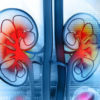Osteoarthritis Treatment in Northern New Jersey
 Osteoarthritis is a type of arthritis that affects the joints. Its cause is unknown, and it often affects people as they grow older. The cartilage that helps bones move smoothly in and around the joints is worn. It may develop roughness or break down to the point that bones are rubbing directly against each other. The rheumatology department at Bergen Medical Associates can diagnose osteoarthritis, and prescribe osteoarthritis treatments. We serve patients throughout northern New Jersey in several convenient office locations.
Osteoarthritis is a type of arthritis that affects the joints. Its cause is unknown, and it often affects people as they grow older. The cartilage that helps bones move smoothly in and around the joints is worn. It may develop roughness or break down to the point that bones are rubbing directly against each other. The rheumatology department at Bergen Medical Associates can diagnose osteoarthritis, and prescribe osteoarthritis treatments. We serve patients throughout northern New Jersey in several convenient office locations.
What Is Osteoarthritis?
Osteoarthritis is the most common form of arthritis. This type of arthritis often shows up in the lower back, hips, knees, hands, and neck. In addition to reduced cartilage and bones operating without cushioning, some patients develop bone spurs, which is bone that grows in the area of the affected joint. Osteoarthritis can develop in people of any age, especially those who have previously experienced an injury to the joint.
What Are Signs and Symptoms of Osteoarthritis?
As is the case with many different types of arthritis, the disease affects people in different ways, and symptoms vary. Here are some of the most common symptoms of osteoarthritis:
- Painful movement
- Swollen and stiff joints
- Reduced movement of the joint
- Unstable or loose joints, or joint deformity
- Clicking or popping sounds with joint movement
Osteoarthritis can eventually damage tendons and ligaments, as well as tissue that lines the joints. The meniscus in the knee and bones can all be affected. When patients react to osteoarthritis with less physical activity, it can lead to weaker muscles and the area of the joint can change shape. Bone and cartilage can break off and circulate within the area. While not everyone with osteoarthritis experiences pain, most people report pain as a recurring symptom.
What Are the Risk Factors for Osteoarthritis?
Some risk factors have been identified for osteoarthritis. These include:
- Aging, with osteoarthritis usually occurring in people after they become 50 years old
- Being female, especially after menopause
- Obesity, as extra weight puts pressure on the joints
- Previous injury to the joint, which may occur more often in younger adults
- Overusing joints, whether due to sports, work routines, playing musical instruments, etc.
- Misalignment in the joint, sometimes stemming from weak muscles
- Family history of osteoarthritis, as the condition can be related to genetic inheritance
- Pre-existing conditions, including gout, rheumatoid arthritis, psoriatic arthritis, diabetes, and high cholesterol
How Is Osteoarthritis Diagnosed at Bergen Medical Associates?
To diagnose osteoarthritis, our medical practitioners in the rheumatology, sports medicine, and internal medicine departments use their experience and information gained through physical examination and testing. Medical history can also be an important element in diagnosing osteoarthritis. Patients should expect questions about their symptoms, past injuries, severity, and recurrence. X-rays, MRIs, or CT scans may be ordered as well so your medical team can get a good look at the condition of the joint. Blood tests can help us rule out other conditions. We may also request joint fluid analysis, where fluid is drawn from the symptomatic joint for examination and testing. Once the condition has been diagnosed as osteoarthritis, the rheumatology team will determine an individualized osteoarthritis treatment plan.
What Are Recommended Osteoarthritis Treatment Options?
Osteoarthritis treatments help patients reduce the pain of this condition. The goal is to increase physical activity and make those movements less painful and easier. In addition, we want to prevent the condition from worsening. Osteoarthritis treatment plans at Bergen Medical Associates may include:
- Over-the-counter medications: These may include pain relievers and non-steroidal anti-inflammatory drugs (NSAIDs). Antidepressants may also be recommended.
- Wearables: These may include orthotics (to help foot balance) and braces (for extra support).
- Lifestyle changes: Quitting smoking, losing weight, and maintaining a healthy lifestyle are key.
- Physical therapy: This aims to strengthen muscles, increase flexibility, and reduce pain.
- Massage therapy: These include specialized medical massages, as opposed to massages provided at a spa.
- Occupational therapy: This helps patients to adopt less painful methods of performing tasks at home and work.
- Transcutaneous electrical nerve stimulation (TENS): This provides pain relief using a low-voltage electrical current.
- Injections: These may include cortisone or hyaluronic acid shots.
If these non-invasive treatments fail, patients may be referred for surgical interventions, such as joint replacement.
How Can I Get Care for Osteoarthritis in Northern New Jersey?
If you are experiencing the symptoms of osteoarthritis, schedule an appointment with the experienced medical practitioners at Bergen Medical Associates. We serve patients at convenient locations throughout northern New Jersey. For more information, contact us today.










